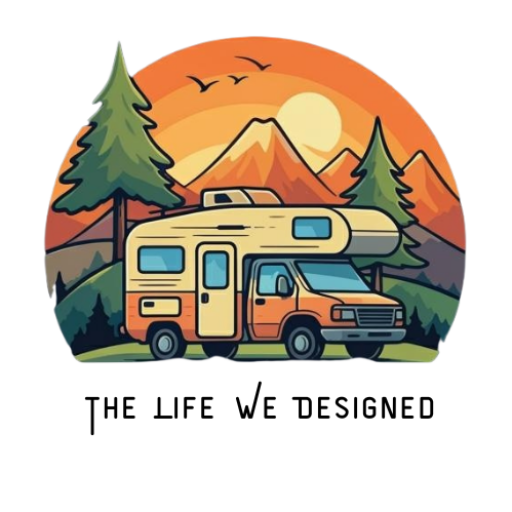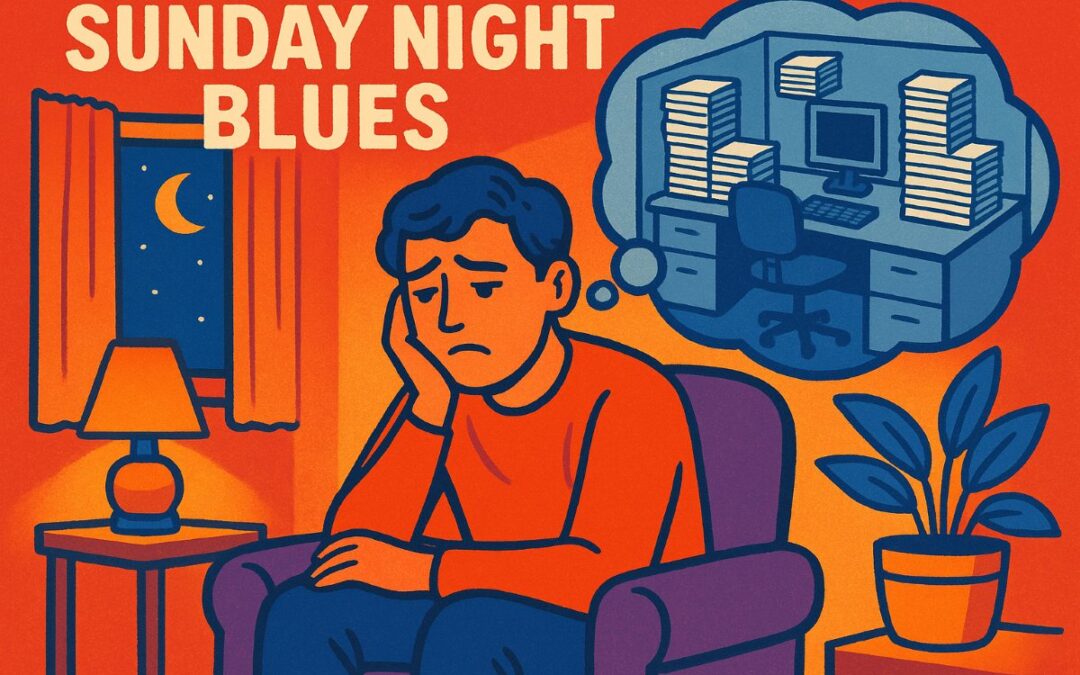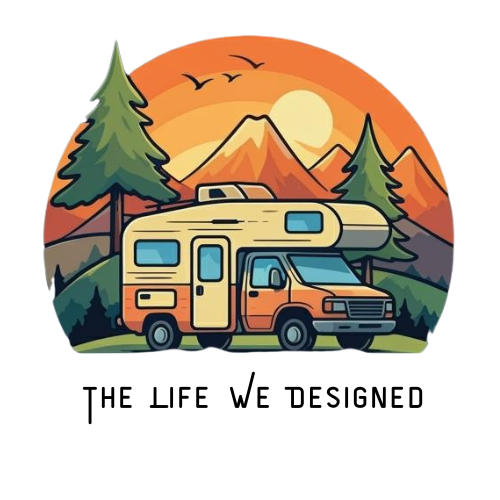A full-time RV lifestyle represents more than just a change of address – it’s an escape from the Sunday night paralysis that grips millions of corporate workers. You know the feeling: it’s 6 PM on Sunday, and your stomach tightens as thoughts of tomorrow’s meetings, deadlines, and fluorescent-lit cubicles crash into your weekend peace.
But imagine a different Sunday evening, where you’re wrapping up a day of hiking in Colorado, or watching the sunset over Arizona’s desert landscape. Your “office” for tomorrow might be overlooking the Pacific Ocean or nestled in a serene forest.
This isn’t a vacation fantasy – it’s a reality for thousands who’ve traded their cramped cubicles for the open road. The key to this transformation? It starts with downsizing – not just your possessions, but your entire approach to what you really need to live a fulfilled life.
Contents
Understanding the Sunday Night Blues
The phenomenon of workplace burnout has reached epidemic proportions, with studies showing that 76% of Americans experience Sunday night anxiety. For those dreaming of a full-time RV lifestyle, these statistics aren’t just numbers – they’re a weekly reality.
The traditional cycle is painfully familiar: you survive Monday through Friday, attempt to decompress on Saturday, and spend Sunday dreading the week ahead. Meanwhile, your social media feed fills with images of remote workers running their businesses from scenic mountain overlooks and beachfront RV parks.
Why do we accept this cycle as normal?
The average office worker spends 90,000 hours under artificial lighting, staring at screens, and navigating office politics. That’s time you could spend exploring national parks, meeting fascinating fellow travelers, or building a business that aligns with your values.
The most insidious part? Many stay trapped by the illusion of security – the comfortable salary, the corner office, the prestigious title – what many call the “golden handcuffs.”
Your dreams of living the full-time RV lifestyle aren’t just escapist fantasies. They’re your intuition telling you there’s a more authentic way to live and work. The question isn’t whether to break free – it’s how and when.
Mental Preparation for the Big Transition
Our journey is a conglomerate of many smaller journeys. We left Colorado and drove to Alaska to begin a new life. It was that trip (a very long trip) that made me realize how much I loved traveling and having my tiny home on wheels.
But when we arrived, I felt panic. No job. No house. What are we doing traveling so far away from our family and friends?
We rented a house, but after winter turned to spring, I was ready to get back into the RV. I talked my employer into letting me work remotely for the summer, and we explored the state for 3 months. We were hooked.
Instead of taking the bus to work and sitting in a windowless office, I was working on picnic tables beside rivers running with salmon and eagles catching them for dinner.
Transitioning to the full-time RV lifestyle requires more than just physical downsizing – it demands a complete mental reframe of how you define success, security, and home.
The biggest hurdle isn’t usually the logistics; it’s the mental leap from viewing yourself as a corporate professional to embracing your identity as a mobile entrepreneur or digital nomad.
This mindset shift often triggers unexpected emotions.
That designer suit that once represented success? It might suddenly feel like a costume.
Your impressive home address? Soon it’ll be “wherever the road takes me.”
These changes can feel simultaneously liberating and terrifying. The key is recognizing that uncertainty isn’t your enemy – it’s your ticket to freedom.
Consider these perspective shifts:
- Instead of “giving up” your home, you’re gaining the entire country as your backyard
- Rather than “losing” your office, you’re acquiring the flexibility to work from anywhere
- You’re not “abandoning” your career path; you’re creating a more intentional one (Life by Design)
Many aspiring to live the full-time RV lifestyle get caught in the “someday” trap, waiting for the perfect moment to make their move. But here’s the truth: there’s never a perfect time to revolutionize your life.
The most successful full-time RVers share one common trait – they stopped waiting for someday and started taking action today.
The mental preparation stage isn’t about eliminating fear; it’s about learning to move forward alongside it. Your future self will thank you for having the courage to begin.
The 3-Phase Downsizing Strategy
For aspiring full-time RV lifestyle enthusiasts, downsizing is the bridge between dreaming and doing. Think of it as your freedom framework, broken down into three strategic phases that transform an overwhelming task into manageable steps.
When we decided to sell the house and most of what was inside, we were in constant motion. There was no time to have second thoughts because that third yard sale was coming up, and the realtor was coming over, and we were still working full time.
We had no blueprint. But now you do.
Phase 1: The Quick Win Clear-Out
Start with the obvious – those boxes you haven’t opened since your last move, the duplicates cluttering your kitchen, the “maybe someday” items gathering dust in your garage. This phase creates immediate momentum and helps train your decision-making muscles.
Once we decided to hit the road, my shopping trips were less and less. I would ask myself, “Will that fit in the RV, and do we need it?”
Select a room, a drawer, or a closet. Find a corner of a room to store some containers and create three zones: “RV Essential,” “Sell/Donate,” and “Consider Later.” The key rule? If you haven’t used it in six months and it’s not seasonal, it goes (Watch our Instagram account for our occasional downsizing challenges @TheLifeWeDesign).
Your future RV self will thank you for being ruthless here.
Phase 2: The Deeper Dive
Now comes the challenging part – tackling items with emotional weight or perceived future value. This phase requires honest conversations with yourself:
- Will this enhance or burden my mobile lifestyle?
• Can this item’s function be served by something smaller or multi-purpose?
• Does this reflect my past life or my future vision?
• For sentimental items, can I preserve the memory digitally?
I can’t believe the stuff I crammed into the cabinets when we started this journey in 2019 (one of many). A food processor, an electric can opener, and winter gear. They are gone now. And if you plan your trips to follow the seasons, you won’t need that heavy winter gear.
Every season, I do a big clean out, and we follow the one-in-one-out rule, especially with shoes.
Phase 3: The Final Sort
This is where your full-time RV dreams get real. Everything must now fit into your actual RV space. Key considerations:
- Storage capacity of your specific RV model (but keep in mind that they can be overloaded, and then it becomes a safety issue)
- Weight distribution (crucial for safe travel)
- Multi-functional potential of each item
- Weather versatility
- Maintenance requirements
Pro tip: Many successful full-time RVers recommend doing a “practice pack” with everything you think you’ll need. Then, live exclusively from those items for two weeks. You’ll quickly discover what’s essential and what’s truly optional – like that pasta machine.
Tech & Work Solutions
Maybe you are fortunate enough not to have to work on this new adventure. Or at least not work for income. We will probably always work, but on purpose. If you have a mobile office, these tips can help.
The full-time RV lifestyle demands a complete rethink of your work setup. Unlike your current office, where IT handles tech issues and space is abundant, your mobile office requires strategic planning and efficient solutions.
Essential Mobile Office Components:
- Reliable laptop with long battery life
- Backup power solutions if going off grid (solar generators are popular among RVers)
- Mobile hotspot plus signal booster (unless you have satellite)
- Collapsible desk or convertible workspace
- Cloud storage for all documents – because there is no file cabinet
Income Stream Optimization:
Working remotely isn’t just about having internet – it’s about creating sustainable income that travels with you. Consider:
- Converting your current role to remote work (see our article on how to do this)
• Developing location-independent income sources
• Building an online business or consultancy
• Freelancing through established platforms
The Minimalist Setup That Works:
Forget the dual monitors and ergonomic chair. Your new office might be a campground picnic table or your RV’s dinette. Sometimes I go to local libraries and reserve a study room. Working in coffee shops is not my thing – I feel guilty for sitting there all day. Other times, I just take my lap desk out to the fold-up chair that is set up next to the stream. Having variety is important to me, and probably why working in that windowless office was such a drag.
Focus on:
- Portable, lightweight equipment
- Weather-resistant gear
- Easy-to-store solutions
- Reliable backup systems
Remember: The key to successful mobile work isn’t recreating your office environment – it’s adapting your work style to embrace flexibility while maintaining productivity.
Freedom Framework
Before hitting the road in your full-time RV lifestyle, establishing a solid financial and practical foundation is crucial. This framework ensures you’re not just escaping the 9-5, but stepping into a sustainable new life, one by design.
Financial Runway Planning:
These are suggestions by others, but know that we leaped without most of these on the list. 25 years later, we are still viable. But if you have an aversion to uncertainty, you might consider these steps.
- 6-12 months of living expenses saved
• Emergency fund specifically for RV repairs
• Health insurance strategy (many full-timers use health share ministries)
• Budget for campground fees and fuel costs
• State residency and mail forwarding services (who will collect your mail and send it to you?)
The Art of Selling Everything
Don’t just dump everything on Craigslist. Strategic selling maximizes your launch fund.
Most members of my family prefer to trash the stuff in the garage, but I was always the one who said, No, let’s put it on Marketplace. We have sold unwanted items from the RV while camping near Yosemite and other unusual places.
There is always someone who wants the stuff you don’t. Before we left Colorado, we had five weekly yard sales that more than funded our trip up the Alaska Highway.
The house had not sold when we took off, but we had to go since it was empty. It sold while we were in Jasper National Park in Canada, and we had to find a fax machine to have the documents sent to us for signature. Fun times.
Here are some suggestions for where to sell your items, but these days, most can be listed on Marketplace.
- High-value items: Specialty online marketplaces
- Furniture: Local consignment shops
- Collections: Niche buying groups
- Everything else: Staged yard sales
- Unsold items: Tax-deductible donations
Building Your Support Network
Before embarking on your RV adventure, it’s essential to build a support network. That is why we created The Life We Designed community. You can also explore camping membership clubs like Good Sam and Passport America, which offer valuable resources and discounts that can make your travels smoother. Contact me, and I can share the one we use.
Additionally, establish relationships with remote banking services to ensure you can manage your finances from anywhere.
Research mobile RV repair services for those inevitable times when you might need a helping hand on the road. We use national chains that honor warranties. For Example, Discount Tires or Costco for auto and RV tires, Walmart for prescriptions, and Aspen Dental.
Having these connections and resources in place will help you feel more confident and supported as you begin your journey.
First-Month Survival Tips
Start with easier campgrounds near civilization, where you can access amenities and support.
Planning shorter travel days initially can help you get accustomed to the rhythm of full-time RV living without feeling overwhelmed.
We always plan no more than 250 miles daily and are off the road by 4 PM. This allows you to stay rested and see things along the way! Every stop has something different to explore.
On that voyage to Alaska, we saw a dozen bears and a lot of moose. Once we were up there and in an RV park, we talked with a neighbor who was complaining that they did not see any wildlife. When we asked how many miles he traveled daily, he said 500. No wonder!
A flexible schedule will allow you to adapt to unexpected learning curves and experiences on the road. Documenting what works and what doesn’t will be invaluable for future reference and improvement.
Making the Leap
Your first week of full-time RV lifestyle freedom will be equal parts exhilarating and challenging.
Start by booking a week at a well-reviewed campground with full hookups – this gives you time to learn your RV’s systems without pressure. Connect with neighboring RVers; they’re often eager to share tips and welcome newcomers.
Download essential apps like Campendium, GasBuddy, and RV Life for real-time travel planning.
Remember, every full-timer was once a beginner. Join local RV Facebook groups for your current location, and don’t hesitate to ask questions. Your new community is waiting to welcome you. And of course, there is always our community that focuses on those new to the RV lifestyle @TheLifeWeDesigned.
Conclusion
As Sunday evening approaches now, notice how different it feels. Instead of dreading Monday’s alarm, you’re planning tomorrow’s adventure. The full-time RV lifestyle isn’t just an escape from the 9-5; it’s a gateway to writing your own story.
Whether you’re reading this from your cubicle or have already started downsizing, remember: every successful RVer started exactly where you are now. Your next step? Consider taking our quiz to see how ready you are, and get on the waitlist for our Freedom Discovery Mindset Mastery workshop. It really starts with mindset.
Start turning those Sunday blues into Sunday planning sessions for your next destination. The open road is calling – will you answer?



